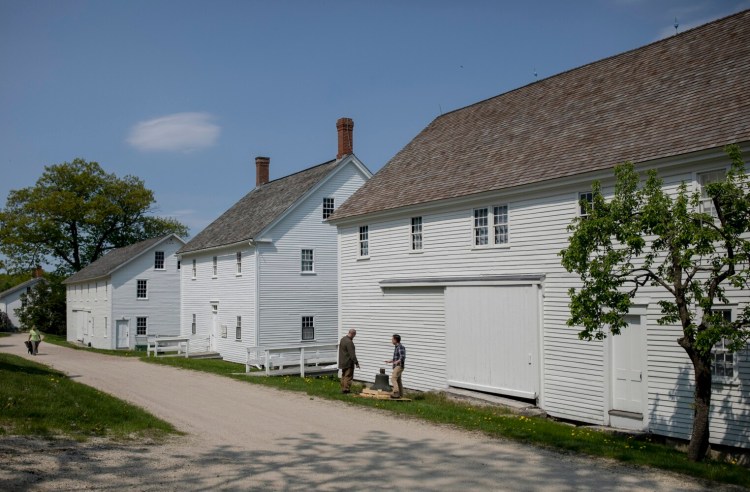A project to rehabilitate the Herb House at the Sabbathday Lake Shaker Village in New Gloucester has been awarded a $750,000 grant from the National Endowment of the Humanities.
The building will be renovated and will provide educational and cultural space at the village, which was established in 1783 and is home to the world’s only active Shaker community. There are currently two residents of the village, Brother Arnold Hadd and Sister June Carpenter.

Tins of Shaker Herbs in the current herb house in 2021. Brianna Soukup/Staff Photographer
The plan is for the building to provide free, self-guided access for visitors to see daily Shaker operations, demonstrations of folk traditions and space for master classes in herbalism, agriculture, culinary arts and traditional crafts. The renovated structure will contain workrooms, gathering spaces, a commercial kitchen classroom, a traditional arts and production studio and a storeroom where Shaker-grown herbs can be purchased.
This is the first time the Shaker Village has sought federal funding and is also the largest award the village has ever received.
Michael Graham, director of the Shaker Museum and Library, said the grant money will be allocated over three years, matching money raised in a separate capital campaign for the project. He said $900,000 has been raised in the capital campaign so far and the total cost of the renovation is estimated at $4.3 million.
The NEH announced its grant recipients Wednesday, awarding more than $33 million for 245 projects across the country and the Shakers’ Herb House Cultural & Traditional Arts Center was one of eight projects to receive a maximum award of $750,000. A spokesman for the NEH said approval of the grant for the Shaker project was unanimous by the endowment’s review board.
The Herb House, built in 1824, is the fourth-oldest structure at Sabbathday Lake. Shakers were among the pioneers in the production of medicinal and culinary herbs in America, but the Shakers’ business collapsed about a century ago as the country’s population moved west and the cultivation of medicinal herbs was supplanted by the pharmaceutical industry, the Shakers’ website said.
The community’s herb gardens have been reclaimed and revitalized, the Shakers say, but the Herb House had fallen into disrepair.
One of the terms of the NEH grant was that construction work was not to begin until the NEH had reached a decision on the award, Graham said, and the timing of the announcement of the award means that the Shakers missed some deadlines with contractors for the upcoming construction season.
He said that means much of the work will get underway in 2023, although there will likely be a formal groundbreaking this year.
Graham and Hadd said the renovation will allow the Shakers to re-enter the herb business, fulfilling a goal the Shaker community in Maine has been following for 50 years.
“It’s certainly been a plan long in making,” Graham said, and the Shakers have high hopes for the herb market, given consumer trends around natural products and renewed interest among people wanting to know where their food and medicine comes from.
Hadd said it’s also hoped that a renovated Herb House will increase visits to the Shaker Village, particularly by students in schools near New Gloucester.
Hadd noted that most of the other buildings in the village are uninsulated, so tourist visits generally run from late spring to early fall. The renovated Herb House will have insulation and heat, meaning programs can be offered year-round, he said.
In addition to self-guided tours, Hadd and Graham said, there will be classes and events centered around herbs, basket-making, soap-making and cooking, and longer-range plans include establishing a woodworking studio, although it probably won’t be located in the Herb House.
“It’s a shift to include programming that is more relevant to local audiences to encourage repeat visitation,” Graham said.
Send questions/comments to the editors.




Comments are no longer available on this story